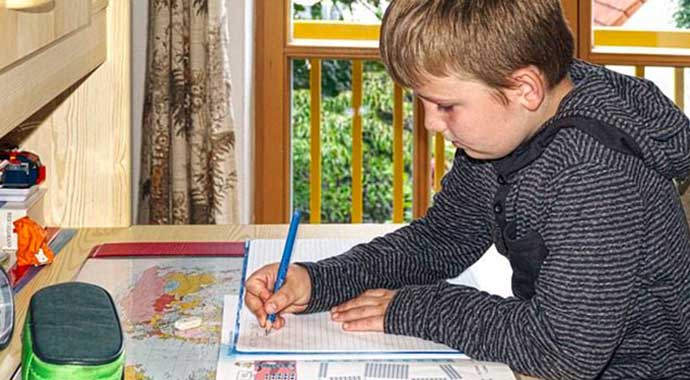As students return to the classroom full-time and workloads ramp up, you might wonder: What’s the right amount of homework? How much is too much?
Those might be the wrong questions, say educators. What matters more is whether homework serves a clearly defined purpose, is properly scheduled and encourages students to think independently.

Gregory Thomas
“Some teachers set homework because they didn’t get their lesson finished,” says Greg Thomas of the University of Alberta’s Faculty of Education, an expert in pedagogical “metacognition,” or taking a step back to question why and how you’re doing any given task.
“That’s not great teaching at all: you’re throwing the onus on the students for what you didn’t get done as a professional.”
Views on homework have evolved significantly in the past few decades. It was once assigned almost as a matter of course. Experts now say strategy is everything, along with the recognition that students today have a lot going on in their lives.
 |
| Related Stories |
| Starting the new school year off right
|
| Why traditional school may not be ideal for your kids
|
| Woke ideology doesn’t belong in schools |
“We want students to be involved in multiple activities, both at school and away from school,” says Thomas.
“We want them to have a balanced education because you learn a lot of things outside of school,” especially those intangible soft skills around communication and interpersonal relations so crucial in today’s workplace.
“In my last couple of years as a teacher, I rarely assigned homework because I came to understand many of my students had lives outside of school,” says Thomas.
“Or I would say, ‘By the end of next week, I’d like you to have done these things.’”
The best way to strike that balance, which Thomas has seen used in numerous schools, is a homework schedule, so students know, in advance, when they’ll be assigned homework in a given subject.
Math homework might fall on Tuesdays, for example, with a set date for completion a few days later.
“Then you can talk to the students about how they’re planning to use their time, rather than demanding that they use their time as you, the teacher, demand,” says Thomas.
“You’re putting into their heads the notion that you value their time outside of school, and you’re trying to help them learn to manage that time in the most effective manner.”
It can also be easy to assume students have a home environment conducive to study, notes Thomas, or that parents will be involved in assisting them. This assumption may be incorrect. If students come from families where the language of instruction in their school isn’t spoken or read at home, it might not be possible.
To help those students, schools should have access to an after-school study space, preferably with staff mentorship.
But regardless of how much homework is assigned, the purpose and outcomes have to be crystal clear – either a consolidation of material studied in class or preparation for a forthcoming lesson, says Thomas.
“That’s where the metacognition comes in. What did I learn from doing my homework that I didn’t know before? Where is it leading, and how might it help me in the future?”
Thomas’s views are supported by an extensive survey conducted by an American non-profit organization called Challenge Success in the decade leading up to the COVID-19 pandemic. It was based on research done by Denise Pope of Stanford University’s Graduate School of Education.
When 200,000 middle and high school students from high-performing schools were asked what stressed them most in life, a typical response was homework. But it wasn’t just the amount that caused anxiety levels to spike.
Assignments perceived as boring or repetitive – or too advanced and confusing – were also to blame, along with worrying about how well they were doing on assignments.
That’s why, along with a clear purpose for homework, there have to be clear expectations about how it will be assessed and what consequences students will face for not doing it, says Thomas.
In junior high, it’s important to impose structure so they know how to respond to external expectations in their lives. It works best when regular and achievable.
“And you have to make sure that those struggling are still achieving something from the homework and aren’t hitting that frustration level,” he adds.
For older students in high school, it’s crucial to encourage them to truly engage with ideas and to think about not just what to learn but how to learn, “given the pace of change in today’s world,” he says.
But some studies, according to Challenge Success, have shown that there is little, if any, evidence homework in elementary school has any positive effect on achievement in most subject areas.
The underlying principle when it comes to assigning homework at any level, says Thomas, is that balance is everything.
“We take students’ mental health very seriously these days. We try to help them find wellness – whether physical, intellectual or mental. It’s about the whole person.”
| By Geoff McMaster
Geoff McMaster is a reporter with the University of Alberta’s Folio online magazine. The University of Alberta is a Troy Media Editorial Content Provider Partner.
The opinions expressed by our columnists and contributors are theirs alone and do not inherently or expressly reflect the views of our publication.
© Troy Media
Troy Media is an editorial content provider to media outlets and its own hosted community news outlets across Canada.

